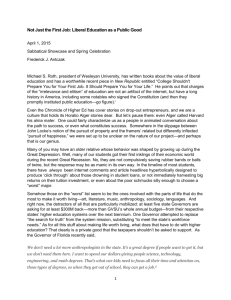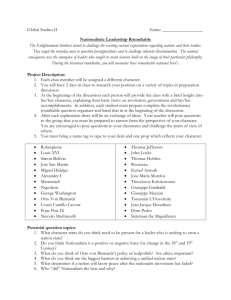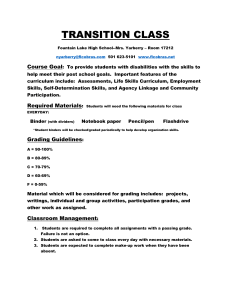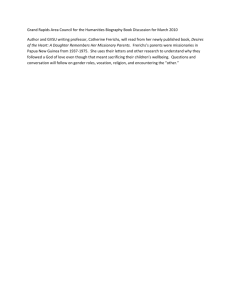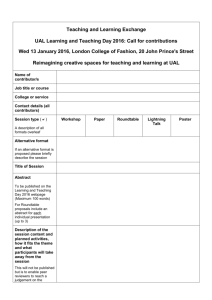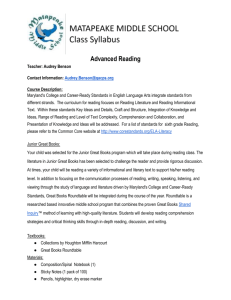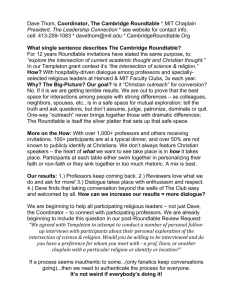Booklet for 2015 Roundtables - Grand Valley State University
advertisement
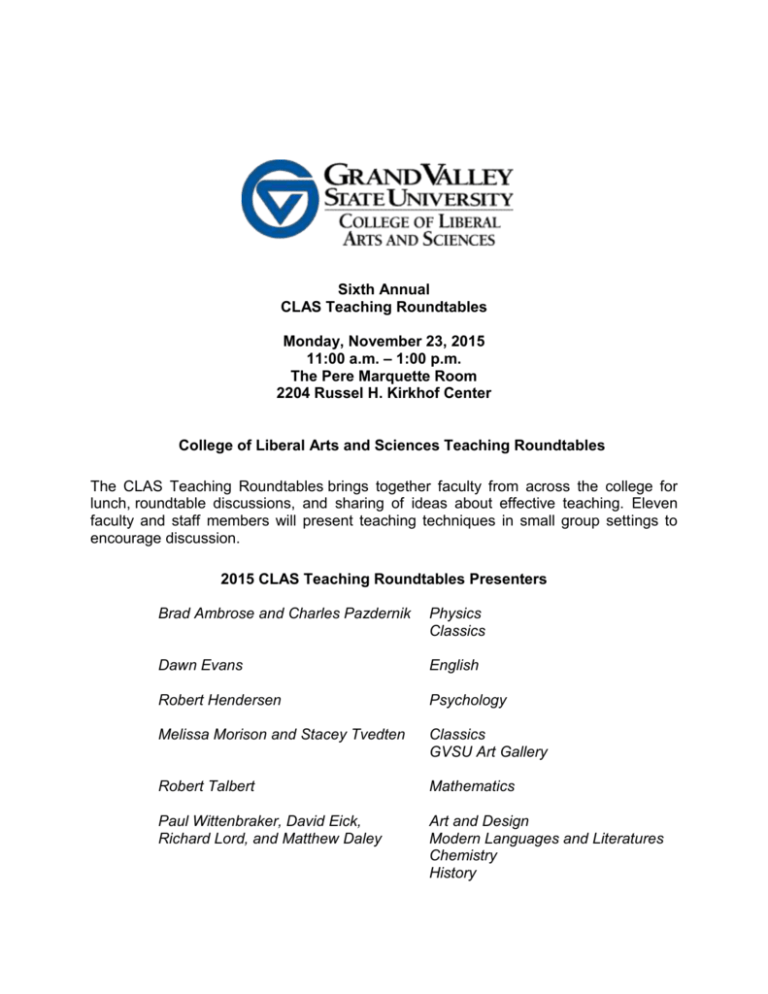
Sixth Annual CLAS Teaching Roundtables Monday, November 23, 2015 11:00 a.m. – 1:00 p.m. The Pere Marquette Room 2204 Russel H. Kirkhof Center College of Liberal Arts and Sciences Teaching Roundtables The CLAS Teaching Roundtables brings together faculty from across the college for lunch, roundtable discussions, and sharing of ideas about effective teaching. Eleven faculty and staff members will present teaching techniques in small group settings to encourage discussion. 2015 CLAS Teaching Roundtables Presenters Brad Ambrose and Charles Pazdernik Physics Classics Dawn Evans English Robert Hendersen Psychology Melissa Morison and Stacey Tvedten Classics GVSU Art Gallery Robert Talbert Mathematics Paul Wittenbraker, David Eick, Richard Lord, and Matthew Daley Art and Design Modern Languages and Literatures Chemistry History Abstracts Challenge Table Brad Ambrose, Physics Department Charles Pazdernik, Classics Department Based on last year’s popularity, we are bringing back the “Challenge” table where faculty can submit other topics related to pedagogy for discussion and brainstorming. This year’s event features outstanding faculty members from both the humanities and the sciences. Organizers encourage topics from any area of pedagogy. Challenge table participants are asked to provide prompts and questions of interest by November 16 along with their sign up information. “Using Readers Theatre to Teach This Year’s Community Reading Project” Dawn Evans, English Department What is the 'fine art' of reader's theatre? How does it help students better understand complex texts? Dawn Evans (ENG) shares her experiences with using Reader's Theatre to help developmental reading students better comprehend the 2016 GVSU community read,Citizen: An American Legend by Claudia Rankine. Reader’s Theatre also has the potential to make an impact beyond language arts and literature. The roundtable organizer, who has taught biology in high school, will offer an opportunity to brainstorm about how this pedagogical approach might be used in different disciplinary settings. Warning: you must be prepared to participate. The first four people to sign up for this roundtable will receive a complimentary copy of the book. “Teaching First-Generation Students” Robert Hendersen, Psychology Department At Grand Valley State University, 37% of first-year students who enter directly after completing high school and 47% of the students who transfer to GVSU after having completed some college work come from families where neither parent earned a fouryear college degree. This roundtable will discuss how instructors and advisors can support first-generation college students. We shall identify some of the areas where instructors and advisors can provide information and guidance useful to first-generation students, recognizing that practices that support first-generation students are also useful for students whose parents did earn college degrees. “Successful Pedagogical Strategies for Using University Art Collections in Your Courses” Melissa Morison, Classics Department Stacey Tvedten, GVSU Art Gallery From STEM to Stalingrad to Strategic Planning – we’re here to help you discover how the University Art Collections can help you meet your teaching goals, no matter what your background or discipline. This roundtable will provide examples of how GVSU faculty are engaging students by incorporating the University Art Collections in their curricula. We will share specific ways the Art Gallery supports GVSU faculty in using art to build proven class and program projects, helping students develop transferable, 21st century skills and helping departments to connect with university strategic planning goals. “Raising Standards and Improving Student Work with Specifications Grading” Robert Talbert, Mathematics Department The traditional form of grading student work, based on point accumulations and partial credit, fails to serve students — and professors — in several ways. In this roundtable we’ll discuss an emerging alternative form of grading known as specifications grading in which points and partial credit are replaced by simple pass/fail grading rubrics, increased student choice in assessment, and multiple student opportunities for revision augmented with rich instructor feedback. “High-Impact Learning Experiences” Paul Wittenbraker, Art and Design Department David Eick, Modern Languages and Literatures Department Richard Lord, Chemistry Department Matthew Daley, History Department Credited with increased rates of student retention and student engagement, high-impact teaching practices have, according to the AAUP, “been widely tested and have been shown to be beneficial for college students from many backgrounds.” Are you interested in organizing more high-impact learning experiences with students? Do you have questions about how to identify potential students for collaboration or how to secure internal funding for your students? The four co-presenters have all had extensive successes facilitating learning experiences outside the classroom. Paul Wittenbraker (ART) has worked with students in his Civic Studio for many years, Matthew Daley (HST) incorporates students into local and regional history projects, David Eick’s (MLL) students have presented their work at national conferences, and Richard Lord (CHM) has co-authored numerous articles with students. They will bring their unique disciplinary perspectives and diverse teaching and collaborative experiences to this discussion.
